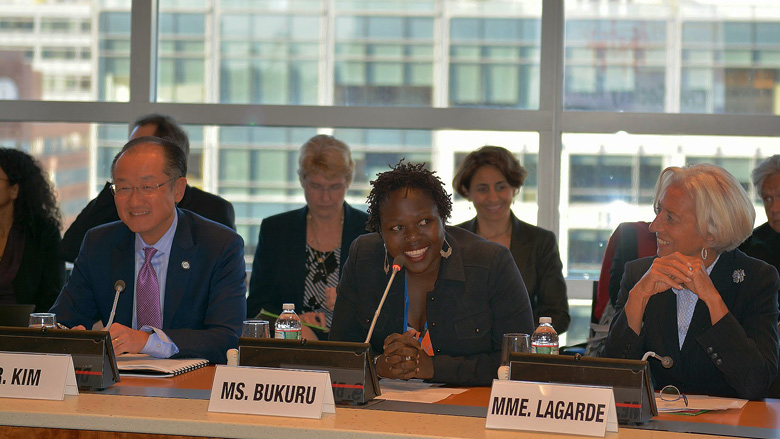The 2014 Civil Society Townhall at the World Bank/IMF Annual Meetings was held at the World Bank’s Headquarters on Wednesday, October 8th. The Townhall provides an opportunity for civil society representatives attending the Meetings to engage directly with the President of the World Bank Group and the Managing Director of the International Monetary Fund. This year, Jim Yong Kim and Mme. Christine Lagarde were joined by Buddy Buruku, Policy Advisor at the African Center for Economic Transformation in Ghana, who moderated the session. The one hour event was attended by some 250 CSO representatives from over 80 countries. For the first time, the Townhall was broadcast live online via World Bank Live, in addition to being live Tweeted. Thus questions were fielded from the floor as well as from the online audience.
In introducing the event, Ms. Buruku set out the following themes for the discussion: IMF and World Bank Operations; WBG safeguards review; poverty and inequality; the global economy and the emerging scourge of Ebola; emerging markets; and citizen engagement and democracy. She asked that participants’ questions follow these themes. She then kicked off the session by herself posing one question each to Mr. Kim and Mme. Lagarde.
The first question was directed at Mme. Lagarde: amidst the current economic climate, Ms. Buruku asked, what keeps Mme. Lagarde up at night— and what gives her cause for hope? Mme. Lagarde quipped that while she is actually quite a good sleeper, she cited three key issues that are currently top priorities for the IMF under her leadership: jobs and inclusive growth; gender equality (particularly education, access to finance, and jobs for girls and women); and climate change. She noted that the IMF has published extensively on equality, including on the relationship between excessive inequality and growth, and how re-distributive policies can promote growth. However, the crucial next step is to operationalize these findings, using them to inform the IMF’s day-to-day work.
Turning to what makes her hopeful, Mme. Lagarde noted the fact that the Fund is being heard. She talked about a recent visit with Japan’s PM, who has recently strongly advocated increasing women’s labor force participation, as a promising example of the progress she has witnessed towards gender equality. She also spoke about the ability of the IMF to very quickly mobilize funds for Liberia, Sierra Leone, and Guinea, the three countries most affected by the Ebola crisis. She shared details from a recent phone conversation with Ellen Johnson Sirleaf, the President of Liberia, who told her that, because of what the World Bank Group and the IMF had been able to contribute they are beginning to see the ‘light at the end of the tunnel’ in terms of fighting Ebola.
Ms. Buruku then asked Mr. Kim what he believes is the role of civil society in the context of the many shifts that have occurred in the development space over the past seventy years, particularly civil society’s role in relation to the World Bank Group. Mr. Kim began by telling the audience that twenty years ago he protested on the sidewalk outside this very building as he joined the 50 Years is Enough Campaign calling for the Bank’s closure on its fiftieth anniversary. But things have changed dramatically since then. Today, members of civil society don’t have to voice their opinions from the World Bank’s sidewalks, but rather are invited into its boardrooms. The Bank has adopted environmental and social safeguards, and governments and CSOs alike have consequently come to expect the adherence to high safeguards standards from all development institutions, including the new development banks that are just now emerging. He noted that the Bank is being scrutinized and that’s very important and positive.

